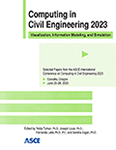An Artificial Intelligence-Based Framework for Automated Information Inquiry from Building Information Models Using Natural Language Processing and Ontology
Publication: Computing in Civil Engineering 2023
ABSTRACT
Building information modeling (BIM), a novel technology in the architectural engineering and construction (AEC) industry, contains various data and information, which is so practical and can be required by many stakeholders during the project’s life cycle. For non-technical users with limited or no skill in dealing with BIM software, access to this data can be time-consuming, and tedious. Automating the information extraction from BIM models can efficiently address this need. In this regard, this research proposes an artificial intelligence (AI)-based framework to facilitate information extraction from BIM models. Therefore, the user can ask questions and receive answers from the framework. Utilizing natural language processing (NLP), an ontology database (IfcOWL) and an NLP method [latent semantic analysis (LSA)], the purpose of the user is understood by the framework through syntactic analysis and semantic understanding of the question and answer to the user, based on functions. The results show that the speed of answering the questions in this framework is up to five times faster than the manual while maintaining high accuracy.
Get full access to this article
View all available purchase options and get full access to this chapter.
REFERENCES
Bird, S., Klein, E., and Loper, E. 2009. Natural language processing with Python: analyzing text with the natural language toolkit, O’Reilly Media, Inc.”.
Desai, A. 2015. A review on knowledge discovery using text classification techniques in text mining. International Journal of Computer Applications, 111.
Ding, L., Zhong, B., Wu, S., and Luo, H. 2016. Construction risk knowledge management in BIM using ontology and semantic web technology. Safety science, 87, 202–213.
Gamil, Y., and Rahman, I. A. R. 2019. Awareness and challenges of building information modelling (BIM) implementation in the Yemen construction industry. Journal of Engineering, Design and Technology.
Gao, G., Liu, Y.-S., Wang, M., Gu, M., and Yong, J.-H. 2015. A query expansion method for retrieving online BIM resources based on Industry Foundation Classes. Automation in construction, 56, 14–25.
Gruber, T. R. 1993. A translation approach to portable ontology specifications. Knowledge acquisition, 5, 199–220.
Kadhim, A. I. 2019. Survey on supervised machine learning techniques for automatic text classification. Artificial Intelligence Review, 52, 273–292.
Kang, T. W., and Hong, C. H. 2015. A study on software architecture for effective BIM/GIS-based facility management data integration. Automation in construction, 54, 25–38.
Koo, B., La, S., Cho, N.-W., and Yu, Y. 2019. Using support vector machines to classify building elements for checking the semantic integrity of building information models. Automation in Construction, 98, 183–194.
Kowsari, K., Jafari Meimandi, K., Heidarysafa, M., Mendu, S., Barnes, L., and Brown, D. 2019. Text classification algorithms: A survey. Information, 10, 150.
Landauer, T. K., Foltz, P. W., and Laham, D. 1998. An introduction to latent semantic analysis. Discourse processes, 25, 259–284.
Leacock, C., and Chodorow, M. 1998. Combining local context and WordNet similarity for word sense identification. WordNet: An electronic lexical database, 49, 265–283.
Liddy, E. D. 2001. Natural language processing.
Liu, H., Lu, M., and Al-Hussein, M. 2016. Ontology-based semantic approach for construction-oriented quantity take-off from BIM models in the light-frame building industry. Advanced Engineering Informatics, 30, 190–207.
Locatelli, M., Seghezzi, E., Pellegrini, L., Tagliabue, L. C., and Di Giuda, G. M. 2021. Exploring natural language processing in construction and integration with building information modeling: A scientometric analysis. Buildings, 11, 583.
Lukasiewicz, T., and Straccia, U. 2008. Managing uncertainty and vagueness in description logics for the semantic web. Journal of Web Semantics, 6, 291–308.
Manzoor, B., Othman, I., Gardezi, S. S. S., Altan, H., and Abdalla, S. B. 2021. BIM-Based Research Framework for Sustainable Building Projects: A Strategy for Mitigating BIM Implementation Barriers. Applied Sciences, 11, 5397.
Nepal, M., Staub-French, S., Pottinger, R., and Zhang, J. 2013. Ontology-based feature modeling for construction information extraction from a building information model. Journal of Computing in Civil Engineering, 27, 555–569.
Palmer, M. 2003. Natural language processing.
Pan, J., Anumba, C., and Ren, Z. Potential application of the semantic web in construction. Proceedings of the Twentieth Annual ARCOM Conference. Edinburgh, UK, 2004.
Tixier, A. J.-P., Hallowell, M. R., Rajagopalan, B., and Bowman, D. 2016. Automated content analysis for construction safety: A natural language processing system to extract precursors and outcomes from unstructured injury reports. Automation in Construction, 62, 45–56.
Wu, S., Shen, Q., Deng, Y., and Cheng, J. 2019. Natural-language-based intelligent retrieval engine for BIM object database. Computers in Industry, 108, 73–88.
Zhang, J., and El-Gohary, N. 2012. Extraction of construction regulatory requirements from textual documents using natural language processing techniques. Computing in Civil Engineering (2012).
Zhang, J., and El-Gohary, N. M. 2015. Automated information transformation for automated regulatory compliance checking in construction. Journal of Computing in Civil Engineering, 29, B4015001.
Zhang, L., and Issa, R. R. 2013. Ontology-based partial building information model extraction. Journal of Computing in Civil Engineering, 27, 576–584.
Zhou, Y., Su, W., Ding, L., Luo, H., and Love, P. E. 2017. Predicting safety risks in deep foundation pits in subway infrastructure projects: support vector machine approach. Journal of Computing in Civil Engineering, 31, 04017052.
Information & Authors
Information
Published In
History
Published online: Jan 25, 2024
ASCE Technical Topics:
- Architectural engineering
- Artificial intelligence and machine learning
- Building information modeling
- Building management
- Buildings
- Computer programming
- Computing in civil engineering
- Construction engineering
- Data analysis
- Engineering fundamentals
- Information management
- Methodology (by type)
- Research methods (by type)
- Smart buildings
- Structural engineering
- Structures (by type)
Authors
Metrics & Citations
Metrics
Citations
Download citation
If you have the appropriate software installed, you can download article citation data to the citation manager of your choice. Simply select your manager software from the list below and click Download.
